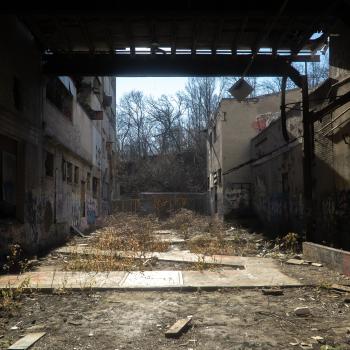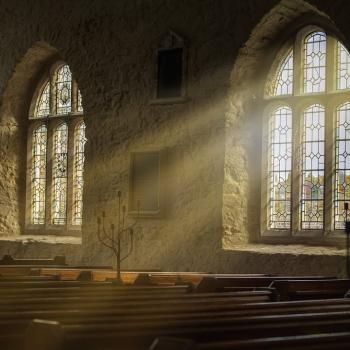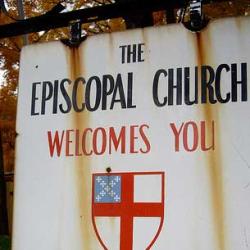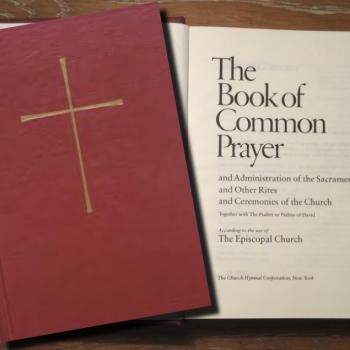 In his report from The Episcopal Church’s House of Bishops, Bishop Daniel Martins described a telling exchange:
In his report from The Episcopal Church’s House of Bishops, Bishop Daniel Martins described a telling exchange:
We began with another table discussion of generous length (about 30 minutes, as I recall). Each table was given a sheet amalgamating all the feedback that had been turned in on sticky notes yesterday concerning how we think we’re meeting the personal and institutional challenges of dealing with the way we tend to systematically marginalize individuals and groups based on criteria over which they have no control (“Who I am” rather than “What I do”).
This went well enough, and then the plenary floor was open to sharing from the table discussions. All was going according to plan. Then one bishop (whom I will not name, though he probably wouldn’t mind) got up and said, in effect, “There’s an elephant in the room, and we’re ignoring it in favor of a bunch of navel gazing.” That’s when everything went off the rails. A handful of others got up and said, “Yeah. There’s an elephant in the room, and we need to talk about it!” Except … nobody actually named the elephant. And I was getting the feeling that those who were giving their Amens to the original comment were all talking about different elephants, but I didn’t know for sure. Was I the only one who was clueless? So I went to the microphone myself and said, “We have a set of Core Values in this House, one of which is to speak directly. But here I am listening to a bunch of us saying that there’s something we desperately need to talk about, and I have no idea what it is.”
After a few more speakers, we took a break while the Presiding Bishop, the members of the Planning Committee, and the chaplains all hung heads together to figure what to do. During the break, several bishops greeted me enthusiastically and thanked me for saying what I did, because they were equally clueless. It felt good not be alone in my ignorance.
Then the bishop who had made the comment that got the whole ruckus started came up to me and clarified what he meant. It was all about the Bishop of Washington’s sermon on Sunday, and her remark about the number of her own parishes that are slowly (or not so slowly) withering away, without even a spark of the sort of vitality that would be attractive to those seeking a deeper spiritual life … and here we are spending four days talking about our feelings and our childhood memories.
When one of my wife’s Presbyterian colleagues heard this story, she said, “This is great! I’ve been waiting for our denomination to do this. What did they say?” Sadly, what my wife (who is also a priest) had to tell her was that the House tabled the conversation for future meetings, ate lunch, and went back to work on the agenda that they had been given for their time together.
But let’s hope that the bishops return to the subject of congregational vitality and give it serious, concerted attention, because if there is one issue facing the leadership of mainline Protestantism today it is the fate and future of shrinking congregations with ever-smaller numbers and evaporating resources.
Why we face those challenges can be traced to a number of factors: Shifting rural-urban demographics; the growth in numbers of those who identify as spiritual but not religious or as Nones; the changing generational interests and expectations; the rise of immigrant populations that have their own traditions; and the decline in numbers of white, middle class communities are just a few of the factors that are beyond the church’s control.
But there are other challenges that that the church can and must address: the failure of mainline Protestantism to give people a vital, inescapable, spiritually grounded explanation for why they should attend church; our over-identification with political causes that can be pursued just as easily without a religious motivation; the lackluster character of our programs for children and youth; (in the case of my denomination) the inescapable and unacknowledged classism of our denomination; and the failure of our congregations to give more than lip service to welcoming people of color, unless they are willing to conform to our cultural affectations and Progressive Protestantism’s theology. There are also serious strategic issues: the location and viability of congregations; resource distribution; the linguistic barriers to serving immigrant communities; and the supervision and training of lay and ordained leadership.
For the moment, struggling congregations and their clergy are bearing the brunt of those challenges. With ever-greater frequency, the solution being offered is part-time ministry. That strategy, however, rarely leads to reversing the financial and demographic trends in parishes that are already in decline. Part-time clergy are left to struggle with the debt incurred in getting an education. They struggle with what it means to be engaged in a ministry that might include part-time pay, but is always full-time in the demands that it makes. And, in the meantime, they struggle to identify the other part-time job that will help them to support themselves and their families.
They should not be carrying that burden alone. As the Bishop of Washington observed in her sermon:
I find myself saying “no” to a lot of interesting things and important work that I could do because I’m the bishop of the Diocese of Washington, precisely because those things keep me from the real work of being the bishop of the Diocese of Washington. And I do my best not to be thrown off course for too long by the storms, but deal with them as effectively as possible, and then redirect my focus on the slow, steady work of revitalizing the church.
One hopes that the House will say “no” to a lot of interesting things the next time it meets and focus on what the Bishop identifies as “the real work” of our bishops.












